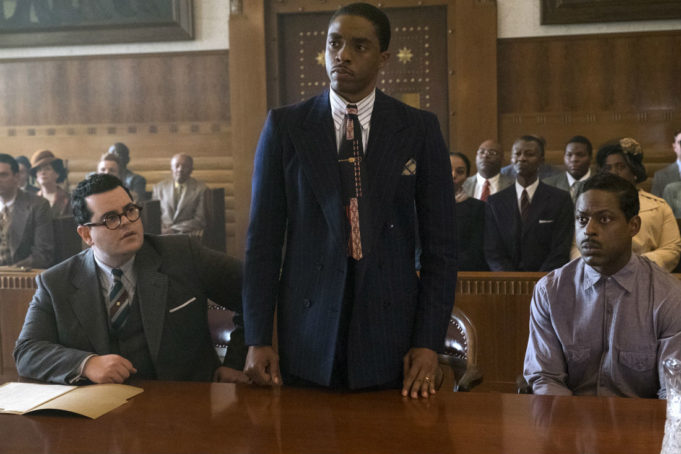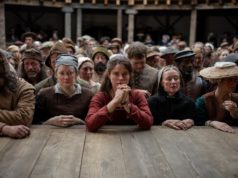When black Americans were wrongly imprisoned in the 1930s and ’40s, there was one phrase that would give them hope they might get justice: “Thurgood’s coming.” Before he was the country’s first African-American Supreme Court justice or had successfully argued for the desegregation of the nation’s schools, Thurgood Marshall was working as the only lawyer for the NAACP. This made him a busy man, as he crisscrossed the country defending innocent people who were accused of crimes only because of their race. Marshall is not a biography of this remarkable man but rather the story of a single case from his glittering career. The result not only gives us great insight into him but also works as the best legal thriller in years.
The story picks up in 1941, when Connecticut socialite Eleanor Strubing (Kate Hudson) accuses her black chauffeur Joseph Spell (Sterling K. Brown) of raping and trying to kill her. Fresh from winning a case in Oklahoma, Thurgood (Chadwick Boseman) is immediately sent up north to defend the man. However, the judge (James Cromwell) rules that since Thurgood hasn’t passed the Connecticut bar, he can’t try the case or even speak in the courtroom — an indignity that not even the most racist Southern judges has ever inflicted on him, he notes bitterly. Thus, the job of defending Spell falls to Sam Friedman (Josh Gad), a Jewish insurance lawyer with no experience trying criminal cases nor any desire to handle a racially charged one.
Outside of playing Black Panther in the Marvel films, Boseman is best known for headlining historical biopics about famous African-Americans, playing Jackie Robinson in 42 and James Brown in Get On Up. This film is his best showcase so far, even though the story deprives him of any chance at florid courtroom theatrics. If anything, it seems to suit him; while his Thurgood is certainly at ease while addressing a crowd of reporters, the man’s most essential quality—his quiet but relentless determination—comes through most forcefully in more intimate scenes. One of Boseman’s finest moments comes early on, when Thurgood first sits down with the defendant and asks, “Did you rape her?” while fixing him with a searching gaze, giving Spell and the audience the impression that he will know if his client is anything other than honest. Marshall’s character judgment again comes in when he arranges to have a white Southern woman (Ahna O’Reilly) put on the jury, into play when he intuits correctly that she’ll do the opposite of what her background would suggest. Without any traditional fireworks, Boseman turns in one of the year’s best film performances.
He’s not alone in his excellence. Gad smartly underplays the courtroom scenes he gets and conveys the impression of a meek man who discovers his inner crusader for racial justice, especially after catching a beating on the street by some racists. Dan Stevens plays the prosecutor and conveys racism simply by radiating outrage and disbelief that a black lawyer would dare to contradict him or sit at his table. (If Stevens wanted to spend the rest of his career playing entitled American douches, he could do it very well.) Brown, best known from TV’s This Is Us, puts in a good shift as well as the uneducated and fearful Spell, somewhat amazed at meeting a black man with Marshall’s level of education and assurance.
The film is directed by Reginald Hudlin, whose constant work in TV has made for a sporadic career on the big screen, though he helmed a fair-sized hit with his 1990 comedy House Party, back when movies about African-Americans were still something of a novelty. His direction here is rather old-fashioned, though no less solid for that. His handling of the flashbacks depicting differing accounts of the crime could’ve been done more deftly, but it doesn’t seriously flaw the film. He and writers Jacob and Michael Koskoff also confront the rape allegation with contemporary sensitivity when Marshall’s wife (Keesha Sharp) advise him: “Women don’t just make up stories like that. You’re going to have to tell the jury why she would.”
Despite taking place decades ago, Marshall speaks to a moment when the White House is determined to roll back so many legal protections people of color have won. This movie gives us a smart, confident hero who uses the law to battle the injustices of the society around him and make America a more equal place for everyone. It all makes for a rousing piece of historical drama.
Marshall
Starring Chadwick Boseman and Josh Gad. Directed by Reginald Hudlin. Written by Jacob and Michael Koskoff. Rated PG-13.












